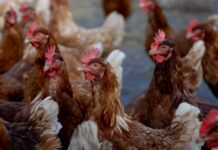OTTAWA – In an effort to control avian influenza in British Columbia’s Fraser Valley, approximately 19 million birds will be killed, according to the Canadian Food Inspection Agency.
This number accounts for all the commercial poultry flocks and backyard birds in a control area established in mid-March.
Although the flu is contagious, the agency said it is not the same deadly strain as in Asia, nor is it the same as what was found in Delaware, New Jersey, Pennsylvania and Texas early this year.
Low to high. Avian influenza was first found in British Columbia Feb. 19, however it was a low pathogenic version. Within several weeks, a high pathogenic strain of the bird flu was confirmed on the same farm.
After avian influenza was detected on two farms, Bob Speller, minister of agriculture and agri-food, established a control area in Fraser Valley to prevent the spread of the flu. The control area’s southern boundary is the U.S. border.
Five infected farms were confirmed in what was called the high-risk area of the control area and Speller called for all birds in the high-risk area to be killed March 24.
Within days, the bird flu was confirmed on farms outside the high-risk area, prompting Speller to announce the depopulation of all birds in the control area.
Aggressiveness. “Due to the rapidly spreading nature of avian influenza, it is clear that a more aggressive approach is needed to control this highly contagious bird disease,” Speller said.
“This is not a decision I take lightly, but it is important for the long-term viability of the poultry industry,” he added.
While it is possible that a significant number of the birds being killed are not infected, this measure is intended as a pre-emptive strike to control the spread of the disease, the inspection agency said.
Poultry from non-infected flocks can be processed under full inspection in registered establishments and made available for sale.
All farm owners whose birds are ordered destroyed will be compensated under the Health of Animals Act.
Vigilance. “As the depopulation effort will take some time, it is critical that everyone – from the poultry producer to those involved in the disease control activities – continue to be vigilant in following strict biosecurity measures,” Speller said.
To reduce the risk of spreading the disease, the Canadian Food Inspection Agency took legal steps requiring poultry owners to control access to their premises by affixing a notice at the entrance of their property prohibiting unauthorized entry to their farm.
While the risk to the general population remains low, health officials have emphasized that personal protective measures for those in close contact with infected birds are extremely important.
Flu in humans. To date, two workers who had separate and known exposure to infected birds have tested positive for H7 infection.
Both experienced mild symptoms and have since fully recovered.
Officials said additional infected farms may be identified while the depopulation effort is underway.
Get 4 Weeks of Farm and Dairy Home Delivered









